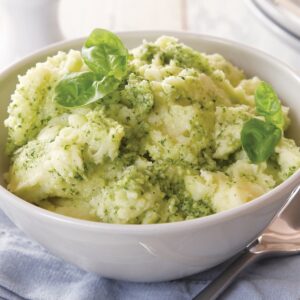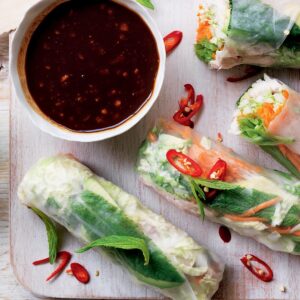
Nutritionist Rose Carr explains what oil to choose for different uses.
Fats and health
Oils are fats, which mean they are high in energy. Just one tablespoon of oil provides around 500-550kJ. That means oils should be used in moderation if you're watching your weight; it does not mean that oils are bad for you. We need fat in our diet: it carries the fat-soluble vitamins A, D, E and K; it provides essential fatty acids; and it adds flavour to our foods. Plant oils also contain a range of phytochemicals that can be good for us.
The fats we eat are classified into different groups. Fats and oils are always made up of a number of these different fats, so we talk about the type of fats they are highest in.
We're encouraged to reduce the amount of saturated and trans fats we consume because they are bad for heart health. Butter fell out of favour as a spread and a cooking fat because it contains over 50% saturated fat.
On the other hand, monounsaturated fats have been shown to be good for heart health. Olive oil is the best known for being high in monounsaturated fats, although macadamia nut, avocado and canola oils also have a high level, so these are all healthy choices.
Polyunsaturated fats split into two groups: omega-6 and omega-3. Both are important for health but it's recommended we eat omega-6 and omega-3 in a ratio of 4:1 or lower, not the 20:1 seen in many Western diets today. The ratio of consumption is important because they compete for metabolic pathways in our bodies. The body will convert the omega-3 ALA into long-chain omega-3s but a high ratio of omega-6 in our diets can stop this from happening. To lower your intake of omega-6 fats, choose oils and spreads low in these as well as reducing your intake of baked or fried foods. For more information about omega-3, see Get your omega-3 from fish.
The moral of this story is that even though oils containing omega-6 are not in themselves bad for us, given the amount we get in our diets we would be better off choosing oils that have a higher content of monounsaturated fats or ones high in omega-3 fats.
Cooking with oils
When cooking with oils there are two key things to think about: quantity and smoke point. Deep-frying or even shallow-frying is not recommended as the food soaks up a lot of oil and it makes the food very high in energy. If you use a seasoned heavy-bottomed or non-stick pan, you can get away with quite small quantities of oil to quickly brown or stir-fry food.
You'll need to choose an oil that won't burn at a high heat, that is one with a high smoke point. When you burn oils, you destroy their goodness; the antioxidants and the structure of the beneficial fatty acids is lost. Rice bran, avocado, soy and safflower oils have very high smoke points that would be suitable for any high-heat cooking like searing, browning or frying (the healthy economical option would be rice bran oil). Sesame, peanut and canola oils also have smoke points over 200°C.
Oil sprays or pumps are a convenient alternative that help you cut down on the amount of oil used in your cooking. A canola oil spray will give a higher smoke point than an olive oil spray. Note that sprays are an expensive way to buy oil (you'll see on the ingredients list the main ingredient is water).
Salad oils
For an oil that will add its own flavour choose olive, avocado or flaxseed oils. If you prefer something more subtle choose canola or rice bran oil.
People watching their weight may be tempted to stop using any oil on salads but research shows the addition of extra virgin olive oil to salad increases the antioxidant content, and avocado oil enhances absorption of beneficial antioxidants lycopene and beta-carotene from the salad. A good reason not to deprive yourself.
Storage
Light, air and heat are the enemies! Protect oils by storing them in a cool dark place. Never use an oil that has gone 'off' or has a rancid smell: it has oxidised (like the rusting of metal) and lost its goodness.
Know your oil
Avocado oil
- High in beneficial monounsaturated fats
- A very high smoke point (270°C) means it's suitable for all types of cooking
- A flavoursome oil also suitable for salads
Canola oil
- High in beneficial monounsaturated fats and containing omega-3 (ALA)
- Suitable for cooking up to 200°C
- With its subtle flavour this is the pick for an economical everyday oil
Flaxseed oil
- Exceptionally high in beneficial omega-3 (ALA) with some omega-6
- Not suitable for cooking as it has a very low smoke point
- Subtle taste makes it a healthy alternative for salads
Hempseed oil
- Has a ratio of 3:1 omega-6 to omega-3
- Smoke point around 165°C so not suitable for high-heat cooking
- Strong herby flavour suitable for salads
Macadamia nut oil
- Exceptionally high in beneficial monounsaturated fats
- Can be used for cooking up to 200°C
- Light distinctive nutty flavour makes it a healthy alternative for salads
Olive oil
- High in beneficial monounsaturated fats, olive oil is heart-healthy
- Choose extra virgin olive oil for its flavour and high level of antioxidants
- Smoke point around 180-200°C so not suitable for high heat cooking
- A flavoursome oil for salads
Peanut and sesame oils
- High in both monounsaturated and polyunsaturated (omega-6) fats
- Smoke points around 210-220°C
- Generally used only where their distinctive flavours are required
Rice bran oil
- High in beneficial monounsaturated fats, rice bran oil has also been shown to lower cholesterol
- With a mild flavour and high smoke point, this oil is suitable for both cooking or salads and it's economical too
Soy oil
- The most common oilseed produced in the world
- Its versatility has made it popular (smoke point over 250°C) but with a
high omega-6 content, even though it does contain some omega-3 (ALA)
you're better to choose something else
Sunflower and safflower oils
- Like soy oil, these are very versatile with a high smoke point
- Very high omega-6 content with no omega-3
- Try canola or rice bran oil instead
Ideas for summer salad dressings
Nutty orange
Mix 4 tablespoons of orange juice with 2 tablespoons of Cathedral Cove macadamia oil and 2 tablespoons of white wine vinegar. Season with a pinch of mustard, salt, pepper and some fresh tarragon. Serve over a tossed green salad with some sliced nuts. Delicious.
Oriental
Mix 2 tablespoons of sesame oil with 2 tablespoons of soy sauce, some crushed fresh garlic and grated fresh ginger. Serve over a mix of grated carrot, cabbage, bean sprouts and fresh coriander, top with toasted sunflower seeds.
Avocado
Mix 2 tablespoons of avocado oil with 2 tablespoons of balsamic vinegar and a squeeze of lemon juice, season with fresh ground pepper. Serve over an open sandwich made with fresh crusty bread, rocket leaves, sun-dried tomatoes and smoked chicken.
www.healthyfood.com










